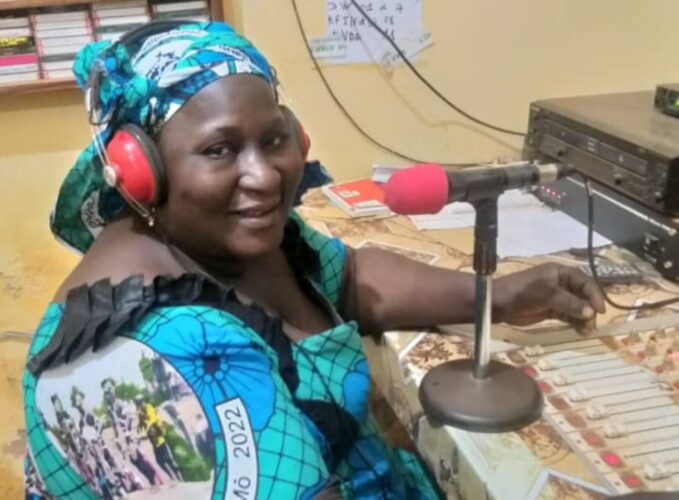It’s a Monday evening, and Adja Malado Diakité sits down behind the microphone at Radio Wassoulou in Yanfolila in southern Mali. She’s about to deliver her weekly radio program, Mousso djôyôrô, or “the place of women in society.”
At first glance, Adja seems like a pro behind the microphone. It’s true that she’s received plenty of training and, at this point, is used to speaking on air. But Adja hasn’t always been a radio show host.
Adja is a market gardener and processor of local products like honey and fonio (a type of millet popular in West Africa). Adja’s involvement with her local radio station started with facilitating women’s community listening groups for Farm Radio’s Scaling Her Voice on Air project, which aimed to improve food security and gender equality in four West African countries.
Through this project, Adja received training on topics like gender issues and interactive radio and participated in design workshops to plan content for radio programs. She also gained practice and confidence speaking on radio programs.
In the first series of radio programs, Adja was an on-air guest about good nutritional practices. By the third series, she was a resource person, being consulted about market products and their proper storage. Adja provided valuable information on topics like preparing soil and producing compost and natural pesticides.
“These programs have brought many positive changes in my life and have especially brought me fame in our locality,” Adja says.
“After each program I hosted, I received many calls for clarification or to provide further information on good market gardening practices. The calls were also to let me know how useful this information was and to discuss solutions to the challenges faced by women in particular.”
Adja has witnessed changes in her community based on the content of the radio programs. Previously, producers sold the same products at the same time, which lowered the market price. Now, they sell a diverse range of products at prices that are both profitable for them and affordable for consumers.
Producers have also learned the value of selling as a group. Based on an episode on women’s groups and group selling, the women producers of cashew nuts organized to sell together. As a result, their prices are uniform — and they enjoy higher profits.
The episode on drying and storing cereals was particularly helpful since producers often suffer large losses at this stage. “Many producers called me personally to tell me how useful this information was to them,” Adja says.
It’s because of Adja’s success on air and her faithful participation in training sessions throughout the project that Radio Wassoulou offered her her own show.
“I have gained confidence in myself and I am very proud to be the second woman at Radio Wassoulou,” Adja declares. “For me, the programs that were produced met the needs of the producers and were very useful for my community.”
Here at Farm Radio, we love to see that kind of lasting impact from our projects. We can’t wait to see what Adja does next!
Read more about the work of Farm Radio International and the Scaling Her Voice project: https://farmradio.org/news/
The Scaling Her Voice on Air project aimed to share information about agriculture and nutrition in a way that met women’s needs, challenged social norms and talked meaningfully about gender equality. The project brought improved interactive radio services to Burkina Faso, Ghana, Mali and Senegal, with two million regular listeners. The Government of Canada, through Global Affairs Canada, supported the project with a grant of $5 million over the five years of the project.
Farm Radio International (FRI) is a Canadian non-profit organization specializing in ICT-enabled extension and communication for reaching rural and remote communities at scale in local languages in sub-Saharan Africa. FRI’s core expertise is collaborative, user-focused co-creation of quality information and advisory services, combining radio and mobile phones, other ICTs and face-to-face interaction.

